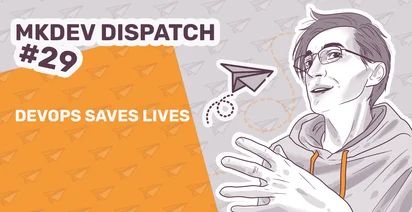DevOps Saves Lives | ✉️ #29

Hey! 👋
By fate (and partly out of a desire to take care of myself), I've been seeing a lot of doctors for the last year and a half. And I've noticed how advanced the medical processes have become in terms of IT. My mind was warped by the notion that everything related to DevOps lies in the realm of internet applications and solutions. But that's not true, and probably the most advanced technologies are in the most offline industries, like retail, warehouse management, shipping, and now, apparently, medicine. I go to the hospital to take a test, get in an e-queue. After a minute, the display shows up and a loudspeaker announces which room and which table I need to go to. The nurse who takes the tests already has all the information about me electronically. No papers. She only verbally confirmed which test would be done and which doctor issued the order. The next day I have an ultrasound, and the specialist who performs the procedure immediately sees the history of observations for the previous years and immediately compares the past observations with the new ones. Ten minutes later, I go to the doctor, and she already sees the results of the ultrasound along with the specialist's conclusions, test results, medical history and diagnoses...
And at some point I realized that somewhere behind the scenes of all these offices and machines, there is a system that quietly (or loudly) rustles, uniting in an internal network medical devices (like ultrasound or MRI), computers on the desks of doctors and nurses, call center operators and electronic queuing systems. Surely somewhere in there is also a system that tracks payments and insurance benefits, wrapped in a tight tangle of microservices. And a team of DevOps engineers making sure the results of the latest patient manipulation are displayed on doctors' computers in real time. Crazy! The security of this whole system deserves a special mention. But it all makes life and the comfort of going to the doctors very much easier. And you know, I am now thinking that perhaps modern medical centers should be a good source of customers for mkdev :)
What We've Shared
On our YouTube channel Pablo continues to talk about Tekton, while Kirill's Dockerless course has reached CRI-O.
'DevOps Accents', episode 21: In this episode of DevOps Accents, Pablo, Leo and Kirill discuss our recent conference experience in London and slightly pit GCP and AWS against each other.
And on the website our classic Terraform Lightning Course continues with its fourth part and a short Tips and Tricks article:
Terraform Tips & Tricks, Issue 1: Format, Graph and State
Lesson 4: Creating Multi-cloud Terraform environment with the help of remote state backends and AWS S3
What We've Discovered
AWS Identity and Access Management provides action last accessed information for more than 140 services: This is a very welcome change, as previously you could only see if the service was accessed by the role or not. Seeing that last used action is much more helpful.
alterNAT: Terraform module to easily provision HA NAT setup for AWS environments. This is cheaper than using AWS Managed NAT Gateway and scalable enough for most environments - plus, there is a fallback option to NAT Gateway.
Granted Profile Registry: granted.dev is already awesome as-is. This new feature to centralized AWS profile management in a git repo lets anyone in the team to quickly configure AWS access locally.
How 37Signals use Prometheus: We love this old-school vibe. Chef, configuring VMs via custom cookbooks. Been a while since we read blog posts like this, refreshing in 2023 - and definitely not a bad alternative to all the cloud native stuff.
Observability at the Edge: Running one K8s cluster per restaurant and collecting billions of metrics from "devices such as fryers, grills, or tablets (user interfaces)" is quite an edgy usange of Kubernetes!
A random reminder
Besides Google Cloud Run & Databases, that will repeat every 2 weeks, as our webinars do, you can always sign up for the AWS Load Balancer Controller 101 free webinar by Kirill. Both of our current webinars can be found on the Webinars page.
The 30th mkdev dispatch will arrive on Friday, October 27th. See you next time!
